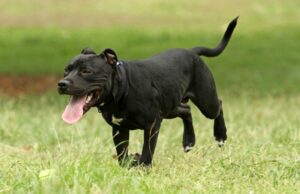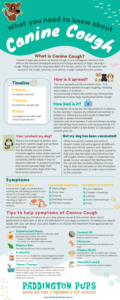Canine Cough (also known as Kennel cough) is a contagious infection that affects the trachea (windpipe) and bronchi (large airways) of dogs. Think of it like the dog equivalent of a human cold or flu.
And like cold and flu, canine cough doesn’t just have one cause. Several germs can cause symptoms of canine cough. The most common ones are:
- parainfluenza virus

- Bordetella bronchiseptica bacteria
- mycoplasma
- adenovirus
- canine respiratory coronavirus (no, not that coronavirus)
These germs can be everywhere.
Who gets canine cough?
Every dog can get canine cough – even vaccinated dogs. This doesn’t mean that the vaccine doesn’t work (although remember no human or animal vaccine is 100% effective).
Vets can vaccinate against two of the most common causes: parainfluenza virus and Bordetella bronchiseptica bacteria. By vaccinating:
- It reduces your dog’s risk of getting canine cough
- Symptoms are mild if they do become infected
- Reduces the prevalence of these germs in the environment
Like colds and flu in people, the young and the old are at increased risk of complications. The immune systems of puppies and older dogs are less able to halt the infection at the upper respiratory tract. They can develop pneumonia.
Signs of pneumonia are loss of appetite, fever, lethargy, and increased breathing effort. Let us know straight away if you see any of these.
What are the symptoms?
Symptoms develop 7–10 days after exposure to the causative germs.
The main symptoms are:
- a hacking cough
- retching or gagging
- a runny nose
Most dogs appear otherwise well, with normal activity levels and appetite. Some will prefer softer foods while their throats are sore.
It often starts with your dog making noises like he’s trying to clear his throat. This can include a retching sound and he might bring up some fluid (phlegm or spit). Over a day or so, this usually progresses to bouts of a hacking cough. Some dogs will cough so forcefully they can vomit.
The first few days are the worst. The cough will often be triggered by things like barking, pulling on the lead, getting excited or going out in cold air.
Symptoms generally resolve over about 7–10 days.
To prevent spread, try to keep your dog isolated from other dogs while he has active symptoms. See our cute infographic below for further info and tips to help symptoms of Canine Cough.
